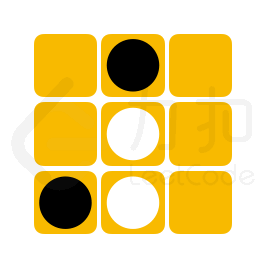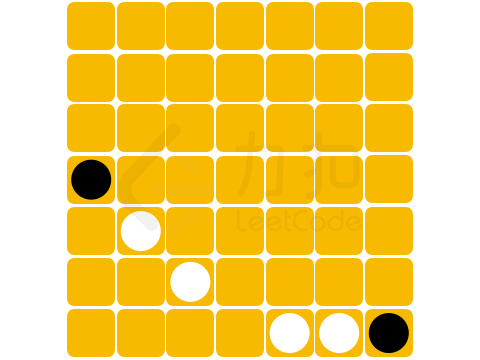在 n*m 大小的棋盘中,有黑白两种棋子,黑棋记作字母 "X", 白棋记作字母 "O",空余位置记作 "."。当落下的棋子与其他相同颜色的棋子在行、列或对角线完全包围(中间不存在空白位置)另一种颜色的棋子,则可以翻转这些棋子的颜色。
「力扣挑战赛」黑白翻转棋项目中,将提供给选手一个未形成可翻转棋子的棋盘残局,其状态记作 chessboard。若下一步可放置一枚黑棋,请问选手最多能翻转多少枚白棋。
注意:
- 若翻转白棋成黑棋后,棋盘上仍存在可以翻转的白棋,将可以 继续 翻转白棋
- 输入数据保证初始棋盘状态无可以翻转的棋子且存在空余位置
示例 1:
输入:
chessboard = ["....X.","....X.","XOOO..","......","......"]输出:
3解释: 可以选择下在
[2,4]处,能够翻转白方三枚棋子。
示例 2:
输入:
chessboard = [".X.",".O.","XO."]输出:
2
示例 3:
输入:
chessboard = [".......",".......",".......","X......",".O.....","..O....","....OOX"]输出:
4
提示:
1 <= chessboard.length, chessboard[i].length <= 8chessboard[i]仅包含"."、"O"和"X"
方法一:BFS
我们注意到,题目中棋盘的大小最大为
我们定义一个函数
在函数中,我们使用队列来进行广度优先搜索,初始时将
时间复杂度
class Solution:
def flipChess(self, chessboard: List[str]) -> int:
def bfs(i: int, j: int) -> int:
q = deque([(i, j)])
g = [list(row) for row in chessboard]
cnt = 0
while q:
i, j = q.popleft()
for a, b in dirs:
x, y = i + a, j + b
while 0 <= x < m and 0 <= y < n and g[x][y] == "O":
x, y = x + a, y + b
if 0 <= x < m and 0 <= y < n and g[x][y] == "X":
x, y = x - a, y - b
cnt += max(abs(x - i), abs(y - j))
while x != i or y != j:
g[x][y] = "X"
q.append((x, y))
x, y = x - a, y - b
return cnt
m, n = len(chessboard), len(chessboard[0])
dirs = [(a, b) for a in range(-1, 2) for b in range(-1, 2) if a != 0 or b != 0]
return max(
bfs(i, j) for i in range(m) for j in range(n) if chessboard[i][j] == "."
)class Solution {
private int m;
private int n;
private String[] chessboard;
public int flipChess(String[] chessboard) {
m = chessboard.length;
n = chessboard[0].length();
this.chessboard = chessboard;
int ans = 0;
for (int i = 0; i < m; ++i) {
for (int j = 0; j < n; ++j) {
if (chessboard[i].charAt(j) == '.') {
ans = Math.max(ans, bfs(i, j));
}
}
}
return ans;
}
private int bfs(int i, int j) {
Deque<int[]> q = new ArrayDeque<>();
q.offer(new int[] {i, j});
char[][] g = new char[m][0];
for (int k = 0; k < m; ++k) {
g[k] = chessboard[k].toCharArray();
}
int cnt = 0;
while (!q.isEmpty()) {
var p = q.poll();
i = p[0];
j = p[1];
for (int a = -1; a <= 1; ++a) {
for (int b = -1; b <= 1; ++b) {
if (a == 0 && b == 0) {
continue;
}
int x = i + a, y = j + b;
while (x >= 0 && x < m && y >= 0 && y < n && g[x][y] == 'O') {
x += a;
y += b;
}
if (x >= 0 && x < m && y >= 0 && y < n && g[x][y] == 'X') {
x -= a;
y -= b;
cnt += Math.max(Math.abs(x - i), Math.abs(y - j));
while (x != i || y != j) {
g[x][y] = 'X';
q.offer(new int[] {x, y});
x -= a;
y -= b;
}
}
}
}
}
return cnt;
}
}class Solution {
public:
int flipChess(vector<string>& chessboard) {
int m = chessboard.size();
int n = chessboard[0].size();
auto bfs = [&](int i, int j) -> int {
queue<pair<int, int>> q;
q.emplace(i, j);
auto g = chessboard;
int cnt = 0;
while (q.size()) {
auto p = q.front();
q.pop();
i = p.first;
j = p.second;
for (int a = -1; a <= 1; ++a) {
for (int b = -1; b <= 1; ++b) {
if (a == 0 && b == 0) {
continue;
}
int x = i + a, y = j + b;
while (x >= 0 && x < m && y >= 0 && y < n && g[x][y] == 'O') {
x += a;
y += b;
}
if (x >= 0 && x < m && y >= 0 && y < n && g[x][y] == 'X') {
x -= a;
y -= b;
cnt += max(abs(x - i), abs(y - j));
while (x != i || y != j) {
g[x][y] = 'X';
q.emplace(x, y);
x -= a;
y -= b;
}
}
}
}
}
return cnt;
};
int ans = 0;
for (int i = 0; i < m; ++i) {
for (int j = 0; j < n; ++j) {
if (chessboard[i][j] == '.') {
ans = max(ans, bfs(i, j));
}
}
}
return ans;
}
};func flipChess(chessboard []string) (ans int) {
m, n := len(chessboard), len(chessboard[0])
bfs := func(i, j int) int {
q := [][2]int{{i, j}}
g := make([][]byte, m)
for i := range g {
g[i] = make([]byte, n)
copy(g[i], []byte(chessboard[i]))
}
cnt := 0
for len(q) > 0 {
p := q[0]
q = q[1:]
i, j = p[0], p[1]
for a := -1; a <= 1; a++ {
for b := -1; b <= 1; b++ {
if a == 0 && b == 0 {
continue
}
x, y := i+a, j+b
for x >= 0 && x < m && y >= 0 && y < n && g[x][y] == 'O' {
x, y = x+a, y+b
}
if x >= 0 && x < m && y >= 0 && y < n && g[x][y] == 'X' {
x -= a
y -= b
cnt += max(abs(x-i), abs(y-j))
for x != i || y != j {
g[x][y] = 'X'
q = append(q, [2]int{x, y})
x -= a
y -= b
}
}
}
}
}
return cnt
}
for i, row := range chessboard {
for j, c := range row {
if c == '.' {
ans = max(ans, bfs(i, j))
}
}
}
return
}
func abs(x int) int {
if x < 0 {
return -x
}
return x
}
func max(a, b int) int {
if a > b {
return a
}
return b
}




